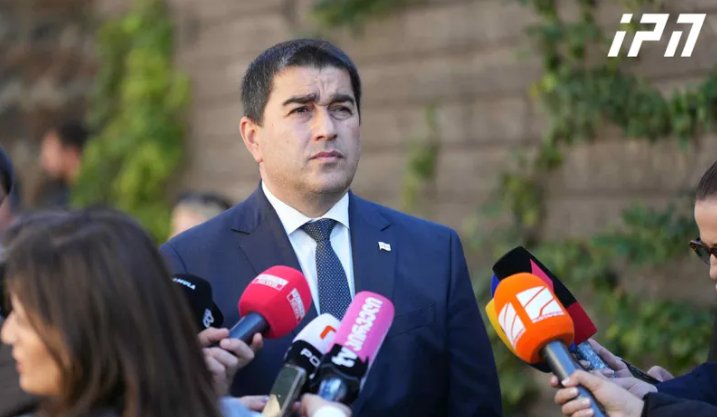Listen to the article
Georgian Parliament Speaker Claims EU Halted Accession Process Before Government’s Controversial Stance
Georgia’s parliamentary speaker, Shalva Papuashvili, has leveled serious accusations against the European Union, claiming Brussels unilaterally suspended the country’s EU membership process months before the Georgian government’s recent controversial statements about freezing accession talks.
During a media briefing with Georgian journalists on Sunday, Papuashvili asserted that the European Union made the decision to halt Georgia’s integration process in June 2024, following Tbilisi’s requests for greater transparency regarding the allocation and spending of EU funds within the country.
“The European Union stopped the enlargement process in June 2024, not us,” Papuashvili told reporters, according to Interpressnews. “They did it because we dared to ask questions about how European taxpayers’ money was used here.”
The parliamentary speaker pointed to a recently published letter from EU Ambassador Pawel Herczynski as evidence supporting his claim that Brussels, not Tbilisi, initiated the suspension of cooperation. According to Papuashvili, this letter confirms that Georgia has been unfairly portrayed as responsible for the deterioration in relations.
Papuashvili defended the Georgian government’s decision to seek an audit of EU-funded programs, framing it as a legitimate accountability measure rather than a provocative action. “Georgia has not withdrawn from anything,” he insisted. “It was the European Union that decided to pause cooperation.”
The accusations come amid a period of heightened tension between Georgia and the EU. Last week, the European Commission publicly accused Georgia’s government of spreading propaganda and undermining democratic principles. The dispute intensified following the November 5 letter from Ambassador Herczynski, which confirmed that Georgia’s participation in several EU-funded regional programs focused on security and organized crime had been suspended.
EU spokesperson Anita Hipper responded to the situation on Friday, emphasizing that the Commission had documented Georgia’s democratic regression in multiple reports and suggesting that Tbilisi was actively spreading disinformation about the relationship.
The diplomatic rift represents a significant setback in what had been a promising path toward European integration for the South Caucasus nation. Georgia signed an Association Agreement with the EU in 2014, gained visa-free travel to the Schengen Area in 2017, and achieved EU candidate status in December 2023 – milestones that had been celebrated as major achievements for the country of 3.7 million people.
However, relations have deteriorated markedly over the past year, with both Brussels and Washington repeatedly expressing concerns about Georgia’s democratic trajectory. International observers have raised alarms about the ruling Georgian Dream party’s handling of elections, erosion of rule of law, restrictions on media freedom, and other governance issues.
The current standoff also occurs against the backdrop of Georgia’s complex geopolitical position. The country has historical ties with Russia but has sought closer integration with Western institutions since its independence from the Soviet Union. The Georgian Dream government has been criticized by opposition figures for allegedly drifting toward Moscow’s orbit while publicly maintaining European aspirations.
Political analysts suggest that the transparency demands regarding EU funding might be part of a broader strategy by the Georgian government to justify potential distancing from European institutions while placing blame on Brussels rather than accepting responsibility for democratic backsliding.
For the European Union, Georgia’s situation presents a challenging test case for its enlargement policies and its ability to maintain influence in the strategically important South Caucasus region, where Russia continues to exert considerable pressure on former Soviet republics.
As the dispute continues to unfold, the prospect of Georgia’s European integration appears increasingly uncertain, with both sides entrenched in contradictory narratives about who bears responsibility for the current impasse.
Fact Checker
Verify the accuracy of this article using The Disinformation Commission analysis and real-time sources.




12 Comments
This dispute highlights the complexities of EU-Georgia relations and the delicate balance of power dynamics in the region. I hope both sides can find a diplomatic solution that serves the interests of all stakeholders.
It will be interesting to see if this leads to a temporary freeze or a more permanent stall in Georgia’s EU accession process. Much will depend on the ability of both parties to compromise.
The Georgian government’s accusation that the EU unilaterally halted the accession process is certainly a serious allegation. I’m curious to see how the EU responds and whether they can provide a convincing counter-narrative.
Transparency around the use of EU funds is a reasonable request from Georgia. The EU should be willing to address these concerns constructively if they wish to maintain positive relations.
The claims made by the Georgian parliamentary speaker seem serious and deserve a thorough investigation. It’s crucial that both sides approach this matter objectively and with a commitment to finding a solution.
Maintaining open lines of communication and a collaborative spirit will be essential for resolving this dispute and preserving the EU-Georgia relationship.
This appears to be a complex geopolitical situation with both sides making claims. It will be important for impartial observers to carefully examine the facts and evidence before drawing conclusions.
Maintaining open communication and good-faith negotiations between Georgia and the EU seems crucial to resolving this impasse.
This is a concerning development that could have broader implications for regional stability. I hope the EU and Georgia can set aside their differences and work towards a mutually agreeable resolution.
Transparency and accountability in the use of EU funds is a reasonable demand. The EU should be willing to engage constructively with Georgia on this issue.
Interesting development in the Georgia-EU saga. It seems like there are differing perspectives on who halted the accession process and why. I’ll be curious to see how this plays out and whether the EU provides more clarity on their stance.
The transparency of EU fund allocation within Georgia is certainly a valid concern. Hopefully the two sides can find a constructive path forward on this issue.